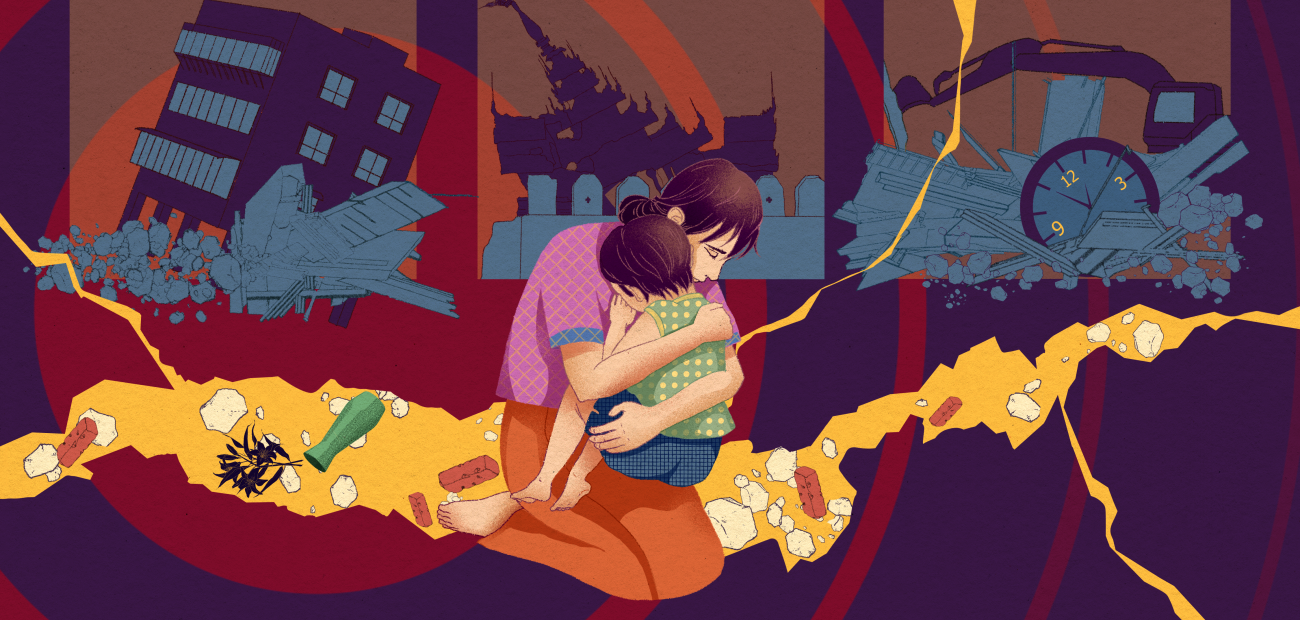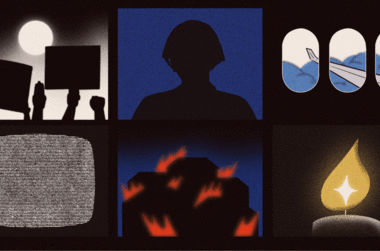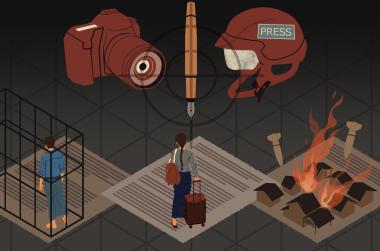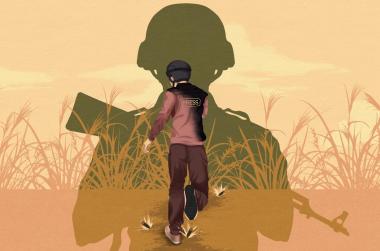The writer is a journalist in Central Myanmar who is receiving support from The Kite Tales to write these diaries.
It was a scorching hot afternoon and I had just finished lunch at home when the ground beneath me started shaking. There was a loud rumbling.
My first thought was of my 4-year-old son and my three young nieces who had come to visit for the summer holidays. They were playing just outside the house.
I had no doubt what was happening and shouted: "It's an earthquake!"
I tried to reach my son but the force of the tremor pinned me to where I was sitting. I kept trying to pull myself up, but I was helpless. I felt like a prune seed being shaken around in a rice basket.
Things started dropping on me from the shelves above, although luckily when the whole bookshelf fell I was able to avoid getting crushed.
I could hear the bricks that made up part of the kitchen crashing down one after another just in front of the shrine for Buddha.
As soon as it abated I rushed outside and saw the four children crying and screaming. It was only then as the children rushed over to me that the burning pain in my chest started to ease a little.
Then another quake hit.
My whole body was trembling as I tried to comfort my scared, crying son. I held him close and sat down on the ground.
“Mom is here, don’t be scared. You’re okay,” I told him and was able to calm him down.
A thought came over me: that I was able to hold my son like this because I didn’t die.
At that moment, one of my nieces came running over.
“The kitchen has completely collapsed, and everything is destroyed,” she said.
An hour after the quake, I still couldn’t get up from the ground. I was still holding my son tightly. At that time, I wasn’t concerned about any belongings at all.
In fact, once we had a chance to look around we realised that everything in the house - everything we had - was broken or damaged. Even the Buddha statues in the shrine had tumbled from their perches and the flower pots were smashed.
When I finally tried calling family members, I couldn’t reach a single one. We started to hear news from the nearby town that many buildings had collapsed and people had died.
That afternoon I went into town by motorbike and what confronted me was truly terrifying.
I vividly remember a group of people gathered around the rubble of a building, saying that three people were trapped inside. But they were still waiting for rescuers. There was so much destruction and so many collapsed buildings, immediate help was just not available.
Within a couple of weeks after the earthquake, the town had undergone changes. There were cleanup efforts and excavators tore down half-collapsed buildings.
We could not stay in our house, so we had to find one to rent.
The losses have been immense, yet I find myself clinging to a fragile gratitude: we are still alive.
For over a decade, I built my life around journalism, a profession that was more than just a job; it was my calling. That life was shattered by the military coup four years ago. After that it was almost impossible to be a reporter. Every single day, the fear gnaws at you: Will I be arrested today? The work became impossible, plunging me not only into financial despair but also a deep, soul-crushing emotional turmoil.
I took on whatever odd jobs I could find, merely existing, each day a struggle for basic survival. And then, from out of nowhere, this earthquake struck, an unforeseen disaster hitting us with brutal force.
For now, my immediate needs are met thanks to the quiet support of a few relatives and friends. It is their kindness that allows me to keep going, to maintain some semblance of life amidst the wreckage.
But the aftershocks continued to rattle us for weeks. I’m not alone in feeling afraid - most people were so terrified of being trapped inside their homes they slept outside, in open fields or in front of their houses.
In our neighborhood, a 50-year-old woman was busy with her job washing clothes when the quake struck. A brick wall collapsed on her, causing a serious injury to her thigh and hips.
But she did not go to the hospital, she endured the pain. When I told her to get medical help, she said: “I only get to eat after doing laundry. Even if the hospital treats me for free, we still need money for transport and food there.”
She said she was also afraid of the aftershocks and of being separated from her family if another earthquake hit while she was at the hospital.
Some buildings at our public hospital also collapsed and were damaged. Later on, because of the sheer number of people injured, temporary field hospitals were set up in places like football fields in town, with banners saying anyone could come and receive free treatment.
I only sustained a minor injury to my hand during the earthquake.
The physical wound healed quickly, but mentally it’s not so straightforward. The moment I hear the word "earthquake," fear and anxiety come flooding back. Even weeks later, I can’t sleep soundly at night.
Artwork by Songbird who is receiving support by The Kite Tales to produce illustrations.





